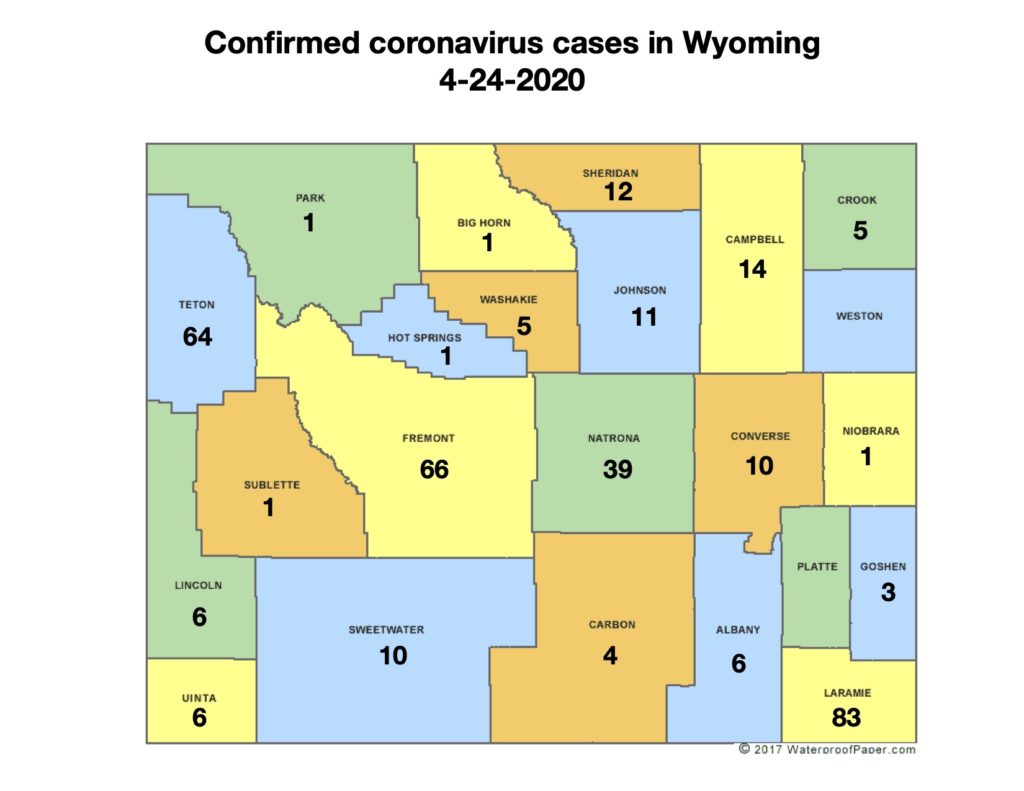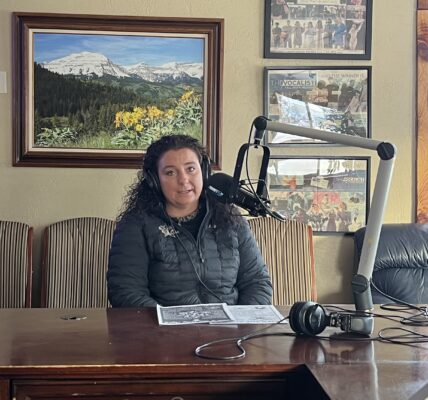
Compiled from Wyoming News Exchange newspapers
The number of confirmed coronavirus cases in Wyoming increased by 17 on Friday due largely to increased testing in Fremont County and on the Wind River Indian Reservation.
The Wyoming Department of Health, in its daily coronavirus update, said 13 new cases were reported in Fremont County, helping push the state total to 349 as of Friday afternoon.
New cases were also reported in Crook, Laramie and Teton counties.
However, Fremont County officials, in their daily report, said much of the increase is due to the boost in testing.
“Fremont County and the Wind River Reservation clinics have incresed the testing and contract tracing surrounding known positive tested individuals for COVID-19,” Mike Jones, the public information officer for the Fremont County Incident Management Team, said in a news release. “With this increase, we will see a larger than average increase in positives listed on the state (update). We expect 10 or more positives to show up.”
As of Friday afternoon, Laramie County had 83 cases; Fremont County had 66; Teton County had 64; Natrona County had 39; Campbell County had 14; Sheridan County had 12; Johnson County had 11; Sweetwater and Converse had 10; Albany, Lincoln and Uinta had six; Washakie and Crook had five; Carbon had four, and Goshen had three. Big Horn, Hot Springs, Niobrara, Park and Sublette all had one case.
The number of probable cases, people who have not been confirmed with coronavirus but who have exhibited symptoms and have been in contact with someone with a confirmed case, was set at 124.
Meanwhile, the total of confirmed and “probable” recoveries increased by 42 — 235 confirmed by laboratories and 86 “probable” recoveries.
The increase occurred as state officials readied their plans to ease the restrictions on businesses and gatherings that were put into place in March.
Gov. Mark Gordon, in a news release and during a news conference Thursday, said the state will take a phased approach to removing the state public health orders that were put in place to slow the spread of the coronavirus.
“This will be a balanced approach that will be driven by two guiding principles: public safety and helping more people get back to work,” he said. “We are going to relax some of the restrictions while also detailing what data we will monitor to make sure we stay on the right path.”
State officials in March issued public health orders closing schools, businesses that attract more than 10 people — such as movie theaters and restaurants — and businesses that provide personal services, such as hair salons and tattoo parlors. Another order prohibited gatherings of more than 10 people.
Those orders are set to expire on April 30, but Gordon said before that happens, modified orders will be issued next week.
County health officials will be able to ask for county-wide variances from those orders if conditions merit the move, Gordon said.
The state will base its decision on whether to approve the requests on six metrics, Gordon said, including how many new cases have been diagnosed, the percentage of cases attributed to community spread, the percentage of coronavirus tests that are positive, total hospital admissions for coronavirus, available hospital beds and available space in intensive care units.
If after relaxing the restrictions, those metrics change for the worse, the restrictions will be put back in place.
The businesses most likely to be allowed to open under the modified rules will be those that provide personal services and gyms, Gordon said, but all will have to operate with safeguards that protect customers and employees.
He added no decision has been made on when restaurants and bars might be allowed to reopen and stressed that the state’s movement into the new phase of the coronavirus pandemic is a work in progress.
“I’ve said before, this will not be a light switch,” he said. “We are building a plane as we are flying it. And with your help, we’ll keep it in the air. We’ll be taking very slow, incremental and thoughtful steps on how to ease these restrictions.”
Gordon said next week, he will provide details on the easing of restrictions including guidelines for modifying business operations and directions to hospitals for resuming elective surgeries.
In other developments:
Supplies delivered: Dr. Alexia Harrist, the state’s health officer, said the state has received enough coronavirus testing supplies to resume testing all of the samples collected from patients around the state. Because of a shortage of testing materials, the state Public Health Laboratory had limited testing to hospitalized patients and health care workers. “Fortunately, our supply situation has … improved, so now we are able to accept samples from patients with symptoms who are outside of those priority groups,” she said.
Primary ballots: State officials are preparing for an increase in absentee voting during the state’s August primary election as a result of the coronavirus. However, Will Dinneen, a spokesman for the secretary of state’s office, said votes cast during the Aug. 18 primary will not all be sent by mail-in ballot. He said Secretary of State Ed Buchanan plans to use federal funds from the coronavirus relief program to expand absentee voting and safeguard in-person polling locations.
Limited school reopening: Superintendent of Public Instruction Jillian Balow, speaking during Gordon’s news conference, said schools around the state should be prepared to have students remain at their homes through the end of the school year. Balow said schools might be able to open on a limited basis to address the needs of students who need in-person instruction. She also said the state’s school districts need to submit a plan for reopening their classrooms in the summer or for the next school year.
Campbell County schools: Campbell County School District trustees have decided to keep schools closed through the remainder of the school year. Trustees, during a meeting Thursday, also agreed to reschedule high school graduation ceremonies at the county’s three high schools for late June rather than cancel the ceremonies or offer them online.
Donated face masks: About 50,000 protective face masks have been donated to the state by the country of Taiwan. Gordon announced Thursday that the masks were donated to help protect frontline workers against coronavirus. “We thank the people of Taiwan for their support of Wyoming as we respond to COVID-19 and protect lives while easing restrictions on businesses,” Gordon said.
Antibody testing: A Jackson group plans to offer antibody testing for coronavirus in Jackson by April 30. Test Teton Now, in a news release, said it would offer the testing through private health care clinics at a cost of $75 per person, although first responders will not need to pay. The test will reveal whether a person has had coronavirus and has developed antibodies to the virus as a result. It will not reveal whether a person has an active case of coronavirus or is immune to the illness.
Electric assistance: A Bridger Valley electric power cooperative is providing assistance to its members who may not be able to pay their bills because of the coronavirus. The board of directors for the Bridger Valley Electric Association agreed to set aside a pool of money to help individuals and businesses pay their power bills until economic conditions improve. “These funds are designed to give our members who are suffering economic distress some much needed relief,” said association Manager Jud Redden.






